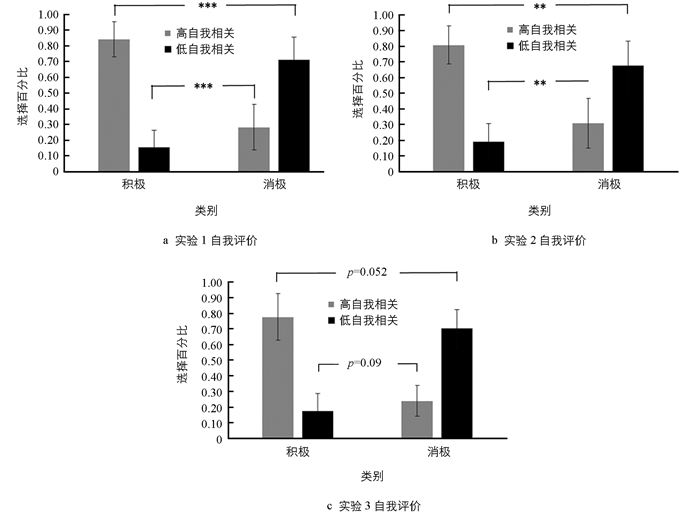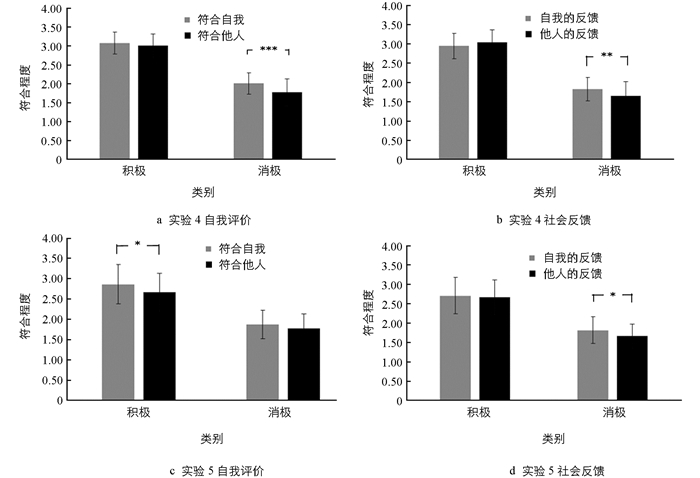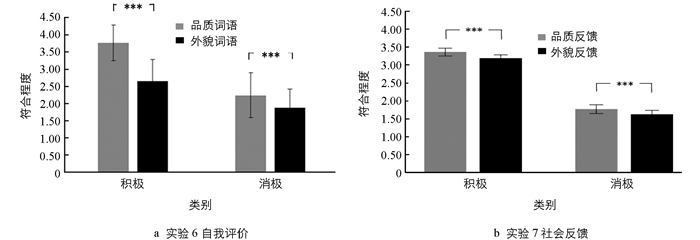-
从个体有自我意识开始,“我是谁”这个问题就一直伴随着我们,这个问题也成为了哲学家、社会学家以及心理学家探讨的核心和热点问题[1].认知心理学利用计算机信息输入、计算和输出原理模拟人类的自我信息加工过程[2].当与自我相关的信息被捕捉和注意到了以后,人们会将其与已有自我图式中的概念匹配,如果与自我概念一致,那么人们会接受和肯定这个新信息;如果不一致,人们会拒绝和否定新信息.然而人类对信息的加工过程并不真的如计算机一样完全按照程序进行,尤其是当这类信息与自我相关的时候,因为这些信息具有很强的情绪效价,一旦有了情绪的参与,人类的行为就会变得复杂起来.
自我积极偏向理论认为人们倾向于用积极的特质来形容和表征自我,也倾向于得到社会的正向反馈[3].也就是说,当自我相关的信息是正性效价的时候,如果这个信息与已有自我概念一致,人们会认可和接纳这个信息;如果这个正性信息与已有自我概念匹配程度不高,但是由于其积极情绪效价的影响,尤其是当这个正性信息与社会价值引导的方向一致的时候,人们也都倾向于认可和接纳.与之对应,自我积极偏向理论同时认为推测人们倾向于认为消极信息与自我不相关,也不愿意得到消极的社会反馈[4].也就是说,当自我相关的信息是负性效价的时候,如果信息与已有自我概念不一致,人们会否认和拒绝这个信息;如果这个负性信息与已有自我概念有相似之处,但是由于受到其消极情绪效价的影响,尤其是当这个负性信息与社会期望的方向不一致的时候,人们也都倾向于否认和拒绝.
由此看来,自我相关信息的情绪效价会影响人们的信息加工策略.然而值得注意的是,人们对自我概念的认知,除了受到积极偏向的影响,还会受到准确性动机的影响[5].为了获得更准确的自我认识,人们会对外在的信息进行审视和评估,尤其外在信息是负性效价的时候,人们会对此信息表现出自我反思和自我批评的态度,从而表现出认可和接纳负性的自我信息的行为.例如,面对“懒惰”这个负性信息的时候,虽然出于积极偏向的需要,人们可能会想对此信息表现出否认和回避,但是出于准确性动机的需要,人们还会根据自己的日常生活表现去反思自我,思考“我有的时候的确有点儿懒惰,我需要改掉自己这个缺点”,从而在一定程度上认可和接纳负性这个信息,最终达到提升自我的目的.
总的来说,人们对自我信息的加工可能同时受到积极偏向和准确性动机的影响.虽然这2种动机会同时影响人们加工正性和负性信息的过程,但是可能其影响程度是不一致的.当加工正性信息的时候,由于正性信息本身的积极框架效应,人们会更容易启动积极偏向动机,表现出对自我相关的正性信息的认可和接纳,无论这个正性信息与已有自我概念匹配程度如何.当加工负性信息的时候,由于负性信息的消极框架效应,人们不仅会启动积极偏向动机,还会启动准确性动机,在这样的框架下进行自我反思和自我批评,因此,虽然人们在总体上会否认负性自我评价,但是也会在一定程度上表现出对负性自我信息的肯定和接纳.
已有关于自我相关信息加工的研究[6-7]几乎都忽略了正性信息和负性信息的加工差异,通常的做法是将负性信息的加工结果进行反向计分,或者是直接将正性信息和负性信息进行比较.但是由于自我积极偏向的强大影响,这样的数据处理结果往往不能揭示负性信息加工的策略,因此,我们将从3个角度分别考察负性自我信息的加工策略.第一个是自我评价视角.请被试用正性和负性的人格形容词对自我进行评价,然后将被试的自我评定结果区分为高自我相关和低自我相关,如果被试表现出对负性自我信息的肯定和接纳的话,那么我们预测被试对负性词判定为高自我相关的可能性要高于将正性词判定为低自我相关的可能性.第二个视角是比较评价自我和评价他人的差异.请被试用正性和负性的人格形容词分别对自我和他人进行评价,如果被试表现出对负性自我信息的肯定和接纳的话,那么我们预测被试用负性信息来评价自我的可能性要高于用负性信息来评价他人的可能性.第三个视角结合自我概念的不同维度,例如外貌自我概念和品质自我概念.由于在个体的自我概念中,心理品质占据着主导地位[8],因此如果被试表现出对负性自我信息的肯定和接纳的话,那么我们预测被试用负性信息来评价自我品质的可能性要高于用负性信息来评价自我外貌的可能性.
本文通过7个实验数据来对以上论述进行验证,需要说明的是,这7个实验数据都已经在杂志发表,但都没有分析负性自我信息加工的特点[7, 9-14].其中实验1,2,3是从自我评价的视角请被试分别用正性和负性的词语来形容自我;实验4,5是从评价自我和评价他人的差异角度来探讨负性自我信息加工的特点;实验6,7是从自我概念的不同维度的角度来探讨人们加工负性自我信息的特点;在实验4,5,7中,被试还接收社会反馈信息,主要考察自我加工负性社会反馈信息的特点.
HTML
-
实验1,2,3是从自我评价的视角请被试分别用正性和负性的词语来形容自我,然后将被试的自我评定结果区分为高自我相关和低自我相关,如果被试表现出对负性自我信息的肯定和接纳的话,那么我们预测被试对负性词判定为高自我相关的可能性要高于将正性词判定为低自我相关的可能性.
实验1为本课题组已发表数据,但原文中并未探讨负性自我信息加工的特点[7]. 32名大学生被试(18名男性,14名女性,平均年龄21.4岁)参与到实验中,他们的任务是用460个人格形容词来评价是否符合自己并且做出4点评分(1:非常不符合;2:不符合;3:符合;4:非常符合). 460个人格形容词来自黄希庭等[15]编制的人格形容词库,其中一半是积极词语,另一半是消极词语,这2类词语在熟悉度和意义度上匹配良好.根据被试的按键选择,将按键结果为1和2的合并为低自我相关条件,将按键结果为3和4的合并为高自我相关条件,被试在4种条件下的选择结果见图 1-a.从图 1-a可以看出,被试将积极词语判定为高自我相关的百分比(0.84%)显著高于将消极词语判定为低自我相关的百分比(0.71%)(t=5.50,p<0.001,d'=1,95% CI[0.08,0.18]),同时被试将消极词判定为高自我相关百分比(0.28%)显著高于将积极词判定为低自我相关的百分比(0.15%)(t=5.48,p<0.001,d'=1,95% CI[0.08,0.17]).
实验2为本课题组已发表数据,但原文中并未探讨负性自我信息加工的特点[9]. 19名大学生被试(11名男性,8名女性,平均年龄21.6岁)参与到实验中.他们的任务是用460个人格形容词来评价是否符合自己并且做出4点评分(1:非常不符合;2:不符合;3:符合;4:非常符合). 460个人格形容词同实验1.根据被试的按键选择,将按键结果为1和2的合并为低自我相关条件,将按键结果为3和4的合并为高自我相关条件,被试在4种条件下的选择结果见图 1-b.从图 1-b可以看出,被试将积极词语判定为高自我相关的百分比(0.81%)显著高于将消极词语判定为低自我相关的百分比(0.67%)(t=3.71,p=0.002,d'=0.94,95% CI[0.05,0.21]),同时被试将消极词判定为高自我相关百分比(0.31%)显著高于将积极词判定为低自我相关的百分比(0.19%)(t=3.47,p=0.003,d'=0.87,95% CI[0.05,0.19]).
实验3为本课题组已发表数据,但原文中并未探讨负性自我信息加工的特点[10]. 21名大学生被试(10名男性,11名女性,平均年龄22.5岁)参与到实验中.他们的任务是用460个人格形容词来评价是否符合自己并且做出4点评分(1:非常不符合;2:不符合;3:符合;4:非常符合). 460个人格形容词同实验1.根据被试的按键选择,将按键结果为1和2的合并为低自我相关条件,将按键结果为3和4的合并为高自我相关条件,被试在4种条件下的选择结果见图 1-c.从图 1-c可以看出,被试将积极词语判定为高自我相关的百分比(0.77%)显著高于将消极词语判定为低自我相关的百分比(0.70%)(t=2.07,p=0.052,d'=0.55,95% CI[0.0,0.15]),同时被试将消极词判定为高自我相关百分比(0.24%)高于将积极词判定为低自我相关的百分比(0.17%)(t=1.78,p=0.09,d'=0.61,95% CI[-0.01,0.13]).
-
实验4和5是从评价自我和评价他人的差异角度来探讨负性自我信息加工的特点,请被试用正性和负性的人格形容词分别对自我和他人进行评价,如果被试表现出对负性自我信息的肯定和接纳的话,那么我们预测被试用负性信息来评价自我的可能性要高于用负性信息来评价他人的可能性.
实验4为本课题组已发表数据,但原文中并未探讨负性自我信息加工的特点[11]. 25名大学生被试(13名男性,12名女性,平均年龄20岁)参与到实验中.他们有4种类型的实验任务,第一种任务是自我评价人格形容词是否符合自己(1:非常不符合;2:不符合;3:符合;4:非常符合);第二种任务是自我评价人格形容词是否符合他人(1:非常不符合;2:不符合;3:符合;4:非常符合);第三种任务是自我是否认可同学对自己人格特点的反馈(1:非常不同意;2:不同意;3:同意;4:非常同意);第四种任务是自我是否认可同学对他人人格特点的反馈(1:非常不同意;2:不同意;3:同意;4:非常同意).实验中的336个人格形容词来自黄希庭等[15]编制的人格形容词库,其中一半是积极词语,另一半是消极词语,这2类词语在熟悉度和意义度上匹配良好.在自我评价的过程中(图 2-a),被试判定积极词语与自我的符合程度(3.08)与判定积极词语与他人的符合程度(3.01)差异无统计学意义(t=1.24,p=0.23,d'=0.23,95% CI[-0.04,0.19]),但是被试判定消极词语与自我的符合程度(2.01)显著高于判定消极词语与他人的符合程度(1.6)(t=7.14,p<0.001,d'=1.2,95% CI[0.29,0.53]).在社会反馈的过程中(图 2-b),被试认可自我的积极反馈(2.95)与认可他人的积极反馈(3.05)差异无统计学意义(t=-1.48,p=0.15,d'=-0.31,95% CI[-0.24,0.04]),但是被试认可自我的消极反馈(1.83)显著高于认可他人的消极反馈(1.64)(t=3.58,p=0.002,d'=0.53,95% CI[0.08,0.29]).
实验5为本课题组已发表数据,但原文中并未探讨负性自我信息加工的特点[12]. 30名大学生被试(15名男性,15名女性,平均年龄20.1岁)参与到实验中.实验材料、实验任务均与实验4相同.被试在自我评价条件下的选择结果见图 2-c.在自我评价的过程中,被试判定积极词语与自我的符合程度(2.87)显著高于判定积极词语与他人的符合程度(2.66)(t=2.73,p=0.011,d'=0.43,95% CI[0.05,0.36]);被试判定消极词语与自我的符合程度(1.88)与判定消极词语与他人的符合程度(1.78)差异无统计学意义(t=1.51,p=0.14,d'=0.29,95% CI[-0.04,0.24]).在社会反馈的过程中(图 2-d),被试认可自我的积极反馈(2.71)与认可他人的积极反馈(2.67)差异无统计学意义(t=0.46,p=0.65,d'=-0.09,95% CI[-0.15,0.25]),但是被试认可自我的消极反馈(1.82)显著高于认可他人的消极反馈(1.66)(t=2.70,p=0.011,d'=0.47,95% CI[0.04,0.28]).
-
实验6和实验7是从自我概念的不同维度的角度来探讨人们加工负性自我信息的特点.在个体的自我概念中,由于心理品质比外貌占据着更加重要的主导地位,因此如果被试表现出对负性自我信息的肯定和接纳的话,那么我们预测被试用负性信息来评价自我品质的可能性要高于用负性信息来评价自我外貌的可能性.
实验6为本课题组已发表数据,但原文中并未探讨负性自我信息加工的特点[13]. 176名大学生被试(89名男性,87名女性,平均年龄21.9岁)参与到实验中.他们的任务是用20个外貌特质形容词和20个品质特质形容词评价与自我的符合程度并进行5级评分(1=一点也不符合,5=非常符合). 20个外貌特质形容词和20个品质特质形容来自人格特质形容词库、字典和网络,积极消极各半. 4类词语在熟悉度和性别区分度上没有显著差异,但是外貌词的可观察度得分要显著大于品质词的可观察度(p<0.001).被试的评分结果见图 3-a.从图 3-a可以看出,被试认为积极品质词与自我的符合程度(3.76)显著高于积极外貌词与自我的符合程度(2.62)(t=21.93,p<0.001,d'=1.64,95% CI[1.04,1.25]),同时被试认为消极品质词与自我的符合程度(2.24)显著高于消极外貌词与自我的符合程度(1.88)(t=8.49,p<0.001,d'=0.64,95% CI[0.28,0.44]).
实验7为本课题组已发表数据,但原文中并未探讨负性自我信息加工的特点[14]. 23名大学生被试(11名男性,12名女性,平均年龄19.7岁)参与到实验中.被试被告知同学对他们的品质和外貌进行了反馈,他们的任务是评价自己在看到这些反馈时候的情绪状态(1=非常糟糕,4=非常好).反馈的词语由288个词语构成,包括72个积极外貌词语,72个消极外貌词,72个积极品质词和72个消极品质词,4类词语在熟悉度和性别区分度上没有显著差异,但是外貌词的可观察度得分要显著大于品质词的可观察度(p<0.001).被试对自我情绪的评分结果见图 3-b.从图 3-b可以看出,积极的品质反馈(3.36)比积极的外貌反馈(3.18)能诱发被试更加积极的情绪(t=4.58,p<0.001,d'=0.96,95% CI[0.10,0.26]),并且相对于消极的外貌反馈(1.63),消极的品质反馈(1.78)诱发的负面情绪更弱(t=5.13,p<0.001,d'=1.03,95% CI[0.09,0.22]).
1.1. 自我相关程度的比较
1.2. 评价自我与评价他人的比较
1.3. 品质自我评价与外貌自我评价的比较
-
本文分别从3个角度考察负性自我信息加工的特点,与研究假设一致,结果发现被试将负性词判定为高自我相关的比例显著高于将正性词判定为低自我相关的比例(实验1,2,3);同时他们都判定自我与负性词语的联系比他人与负性词的联系更加紧密(实验4,5);由于品质在自我概念中占据主导地位,因此与负性外貌词相比,被试不仅认为负性品质词与自我的符合程度更高(实验6),而且在得到负性品质词的反馈后,他们的情绪也更为积极(实验7).
人们在日常生活中会表现出各种自我加工偏向,例如对自我面孔/名字的快速识别[16],在嘈杂的环境中能够听到自己的名字[17],更容易回忆起与自我相关的信息[18],甚至是更多地关注自我的情绪.这种重视自我忽略情境的信息加工方式虽然会导致个体出现各种认识优势和偏向,例如自我面孔识别优势,自我参照记忆优势,焦点效应或透明度错觉等[19],但却促进了自我认识的发展.在人们寻求自我认识的过程中,他们并不会表现得公正无私,相反,他们会在自我提升的动机驱动下表现出积极偏向.人们会认为自己比别人要公正、更加富有和拥有更好的人格、有更加满意的人际关系[4],这种现象在人们的自我评价过程中体现得尤为明显,大量证据表明多数人会用更有利的词汇来描述他们自己,认为自己有更好的品质[6].本文中的结果与以往研究结果一致,被试都将积极词语判定为高自我相关,而把消极词语判定为低自我相关(实验1,2,3);并且被试认为自己比他人拥有更多的积极人格品质(实验5).
由于大多数人不可能比大多数其他人更好,并且积极偏向可能会妨碍人们的自我认识,因此,准确性动机的需要也影响了人们寻求自我认识的方式.有时人们想要知道关于自我的真实情况,而不管这种真实的情况是好的还是坏的[5].人们不仅觉得自己有责任知道真正的自我,而且关于自我准确性的认识是有效帮助我们适应环境的前提条件.准确性动机尤其明显地影响着人们加工负性自我信息,虽然人们会利用积极偏向的动机去回避和拒绝大部分负性信息,但是由于负性自我信息可能会启动了人们自我反思和自我批评的态度,因此人们也会在一定程度上表现出对负性自我信息的肯定和接纳.本文结果与假设相符,被试将消极词判定为低自我相关的百分比显著低于将积极词判定为高自我相关的百分比,这说明被试接纳了一部分负性自我相关信息(实验1,2,3).其次,被试认为自己比他人拥有更多的负性人格品质(实验4),并且也更认可社会反馈的关于自我的负性人格品质(实验5),这说明被试在一定程度上接纳了社会关于自我的负性反馈.再次,由于品质相对于外貌来说,在自我概念中占据主要地位[8],因此被试对负性品质自我信息的接纳显著高于对负性外貌自我信息的接纳(实验6),并且在得到负性品质词的反馈后,他们的情绪也更为积极(实验7).这说明为了更好地自我促进和自我成长,被试加工负性品质自我相关信息的时候采取了自我反思和自我批评的策略,因此在一定程度上表现出对负性品质自我信息的认可.
关于自我认识的动机与策略,以往的研究[4]和理论都重点从一个角度去理解人们的自我信息加工的模式:为了保持积极的自我概念,人们会肯定正性信息并且否定负性信息.例如多数人都认为自己具备很多积极的人格品质并且很少的消极品质;为了获得良好的自我感受,人们会通过自我设限的方式来处理负性自我信息;只有那些具有消极自我观念的人才会寻找和认可关于他们的负性信息.然而从本文的结果和分析可以看出,人们可能采取了不同的策略来加工正性自我信息和负性自我信息.当加工正性信息的时候,由于正性信息本身的积极框架效应,人们会更容易启动积极偏向动机,表现出对自我相关的正性信息的认可和接纳,无论这个正性信息与已有自我概念匹配程度如何.当加工负性信息的时候,由于负性信息的消极框架效应,人们不仅会启动积极偏向动机,还会启动准确性动机,在这样的框架下进行自我反思和自我批评,因此,人们会尽可能地肯定正性自我评价,虽然人们在总体上会否认负性自我评价,但是也会在一定程度上表现出对负性自我信息的肯定和接纳.
内省和社会反馈是认识自我的2条主要途径[20-21].内省是指自我评估、自我评价以及自我衡量的过程,而社会反馈是将外在社会评价与已有自我概念融合的过程.本文不仅从内省的角度发现人们可能会对负性自我信息加工采用反思接纳的策略,而且从社会反馈的角度发现由于人们在一定程度上接纳了负性自我信息,因此在自我概念重要维度上的负性社会反馈(品质反馈)会让他们的情绪更为积极.这也说明在自我认识的过程中,无论是通过内省的方式,还是通过社会反馈的方式,人们都采取了2种不同的策略来处理正性和负性自我信息,最终的目的是为了获得更为准确的自我概念.
值得慎重的一个问题是,个体对负性自我信息加工的反思和接纳是否具有人群适用的普遍性.本文所有数据都是基于集体主义文化下的中国人为被试,中国人的认知具有朴素的辩证主义倾向[22],这会使得他们更能忍受冲突和不一致,可以同时接受积极的自我和消极的自我.相比而言,西方文化下的个体更强调认知的一致性,不能忍受冲突,认可积极的我就意味着拒绝消极的我[23].已有的以西方人为被试的结果发现[4],人们用负性词语来描述他人的可能性高于用负性词语来描述自我,这与本文中的结果正好相反.由此看来,在西方文化下的个体是否对负性自我信息加工采取反思和接纳的态度,还需要进一步探索.其次,无论是正性框架下的积极偏向动机,还是在负性框架下的自我反思和自我批评策略,本文都仅进行了推测,未来还需要借助更为精妙的实验设计或者更加先进的技术,对这一问题进行探索和验证.









 DownLoad:
DownLoad: